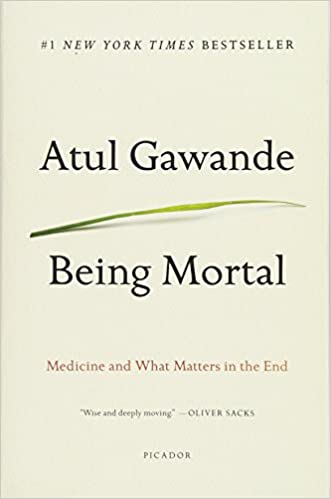If you are struggling with grief, it’s straightforward for it to turn into anxiety. But, even during the most challenging of times, there are things you can do to take control of your emotions and avoid adding more stress and anxiety to your life. So keep reading as we share how you can stop grief from becoming a cause of anxiety with these simple and actionable steps.

Being Mortal
by Atul Gawande
⏱ 14 minutes reading time
🎧 Audio version available
Check-in With Yourself
One of the biggest reasons individuals feel anxious after a loss is because they haven’t given themselves the time to process their grief truly. Take some time to think about how you are doing. And whether you are trying to avoid certain parts of this process out of pain or fear. You may find you can work through your grief alone, or it may be best to speak to someone you love or even a professional. Taking the pressure off yourself and allowing yourself to grieve fully is the first step to avoiding long-term anxiety.
Stop Feeling Guilty
Is there something you wish you had said or done that makes you feel guilty while grieving? Regret and guilt are two of the top causes of anxiety, and they can be challenging to overcome. However, if someone has passed away, remind yourself that it’s never too late to ask for forgiveness. Also, don’t feel guilty for taking time out for yourself to grieve and process your emotions, as it will make you a better and happier person in the long run by dealing with how you feel now.
Speak to Someone
If you haven’t already spoken to someone about your feelings, it’s never too late to reach out for help. A loved one or professional will always be there to help, and you’ll find by sharing the problem you are going through, you’ll relieve some of the burdens. Don’t keep things up, as this will result in feeling more anxious further down the line. Always reach out to someone when you feel alone or start to feel anxiety building, so you can put a stop to those feelings before they escalate.
Express Your Feelings by Journaling
It’s completely understandable if you don’t feel able to express your feelings out loud. If that’s the case, consider journaling as a way to process your grief. Writing is a potent tool and helps you explore your feelings and the triggers of your potential anxiety. You’ll find that it releases the tension you are feeling and can also help you to connect to anyone you’ve lost recently. Write in your journal first thing in the morning and the last thing at night to help you focus on your daily activities and get a good night’s sleep.
Embrace Rest
There’s no denying that it can be almost impossible to sleep when you are going through a challenging time. However, by giving your body and mind the rest they need, you’ll find that you wake up less anxious and have more energy to tackle the tasks you need to complete that day. We all need to embrace rest more, so never feel guilty for giving yourself a break. Instead, avoid putting too much on your plate at this difficult time, and just focus on the things you have to do each day.
Meditate
Meditation is one of the critical tools to avoid anxiety. If you’ve never tried meditation before, don’t overthink it; just have a go at a guided meditation that you can find online. This will help you take some much-needed time out of your busy life and focus on how you feel. If you find your mind is constantly wandering, this may be why you might end up feeling anxious. By grounding yourself in the present with meditation, you’ll be less likely to feel uneasy in the future.
Maintain a Good Routine
While many of our tips thus far focus on the emotional aspects of grief, it’s essential to also think about practical ways to avoid anxiety. Even when you don’t feel like doing your daily tasks or going to work, try to maintain some semblance of your routine. A structure can help you to avoid feelings of anxiety and will give you something to focus on. For example, create a to-do list each evening before you head to bed that’s manageable and not too ambitious. This will give you a guide to keep you on track and stop you from dwelling.
Look After Your Health
Anxiety is closely linked with other aspects of our mental and physical health, which is why you should always look after yourself during a difficult time. Make sure you are eating healthy, getting daily exercise, and sleeping well. Even on those days where you just want to stay in bed all day, try to get up and stay active as much as you can manage. You’ll find that exercising regularly and sleeping well are two of the critical tools to combat anxiety, so the sooner you find a good routine, the better you’ll feel.
Anxiety and grief are often very closely intertwined, but that doesn’t mean you have to find yourself feeling anxious after a loss. Make sure you look after yourself every day during this difficult time, and always know that there is someone you can reach out to for help. Don’t put too much pressure on your body and mind during this time, and take things one day at a time to avoid anxiety building up in the future.
What Is Snapreads?

With the Snapreads app, you get the key insights from the best nonfiction books in minutes, not hours or days. Our experts transform these books into quick, memorable, easy-to-understand insights you can read when you have the time or listen to them on the go.



